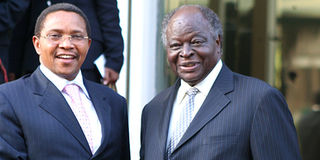Kikwete: Tanzania backs Kenya's operation in Somalia

Tanzanian President Jakaya Kikwete and his Kenyan counterpart Mwai Kibaki. President Kikwete said his country supports Kenya’s military offensive against Somalia militia Al-Shabaab October 28, 2011. FILE
Tanzanian President Jakaya Kikwete has supported Kenya’s military offensive against Somalia militia Al-Shabaab.
He said his country backed Kenya's decision to invoke Article 51 of the United Nations Charter to defend its economic and security interests under threat by the terror group.
President Kikwete said Kenya is justified in taking action against the Islamic militants who have blatantly violated her territorial integrity through escalated cross-border raids.
He pledged his country’s commitment to support efforts by Kenya, IGAD, EAC, AU and the international community to stabilize Somalia and the Horn of Africa region.
The Tanzanian leader, who is in Perth, Western Australia for the Commonwealth Heads of Government Meeting (CHOGM) 2011, was speaking when he paid a courtesy call on President Kibaki Friday.
The meeting followed an earlier brief by President Kibaki to an executive session on Kenya’s military operation against Al-Shabaab to secure national security and economic interests.
During the session, President Kibaki maintained that Kenya was not at war with Somalia but is carrying out military action against the Islamic militia which is a non-state actor.
The Tanzanian leader, at the same time, joined other world leaders in calling for tougher action against piracy in the Indian Ocean, which continued to increase the costs of international trade and cause enormous harm to regional countries' fishing and tourist industries.
Earlier, at a forum on Indian Ocean Piracy held on the sidelines of the Commonwealth Heads of Government Meeting, participants observed that piracy is now rife off the coast of Somalia and is spreading to other regions around Africa.
The leaders noted that pirates attacked a record number of ships worldwide in the first nine months of 2011, but are making off with fewer vessels due to better policing by international naval forces.
Leaders were of the view that the financiers of piracy must be targeted and pursued through surveillance, so that the true beneficiaries of the illegal trade may be brought to justice.




